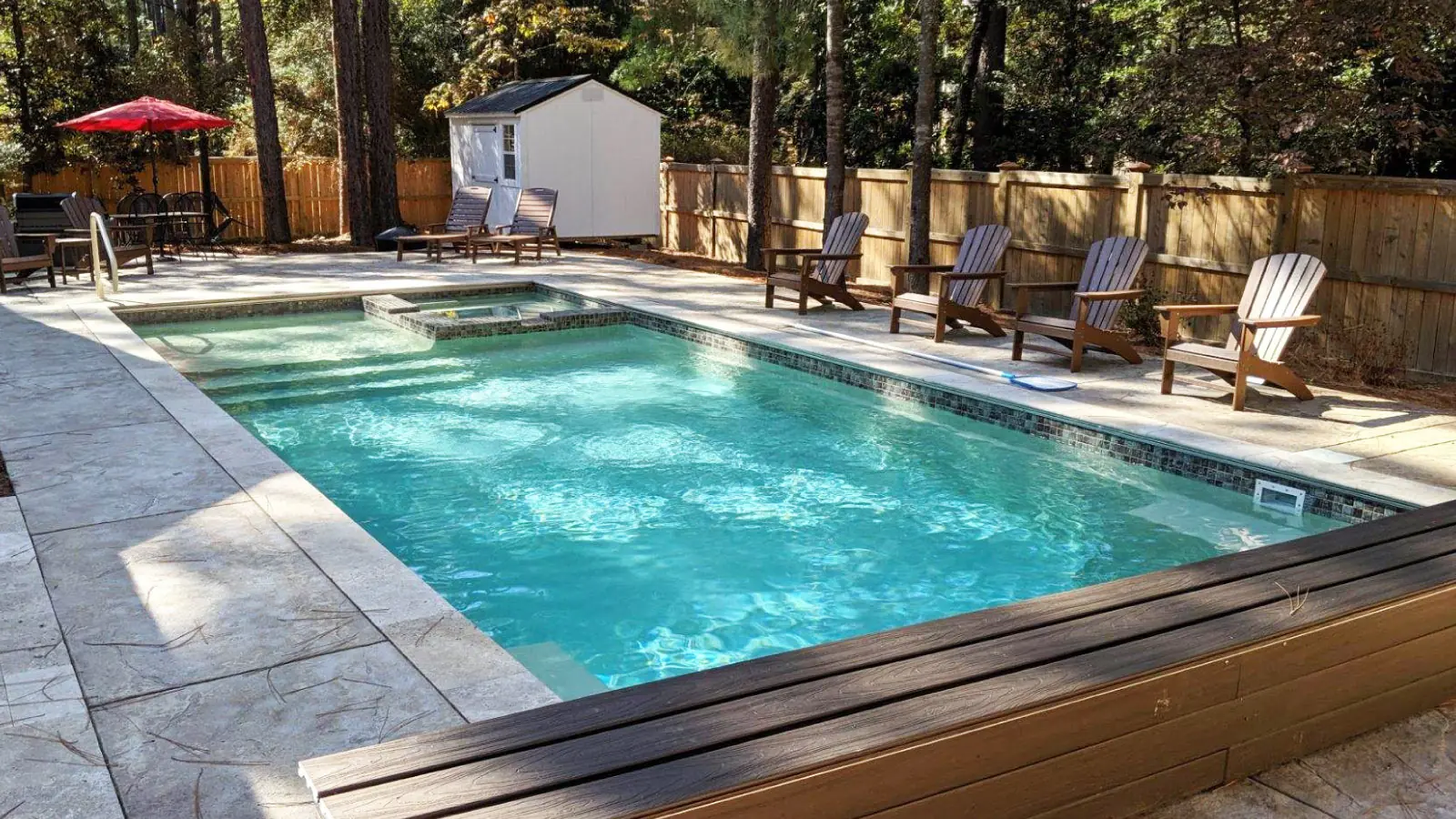
Pool Maintenance Made Easy
Imagine diving into a crystal-clear pool on a warm summer day—refreshing, right? But what if your pool water was murky, filled with debris, or had an unpleasant odor? Pool maintenance may seem overwhelming, but with the right approach, it can be effortless and rewarding.
Introduction
Have you ever wondered why some pools stay pristine while others turn green? A well-maintained pool isn’t just about aesthetics—it’s about safety, longevity, and cost savings. Many believe pool upkeep requires hours of work each week, but with the right routine, it’s surprisingly simple.
This guide will walk you through a stress-free approach to pool maintenance, ensuring your swimming pool remains clean, safe, and inviting year-round.
Why Fiberglass Pools Are Low Maintenance
If you’re looking for a pool that requires minimal upkeep, fiberglass pools are an excellent choice. Here’s why:
- Durable and Non-Porous: Unlike concrete pools, fiberglass surfaces resist algae buildup, meaning fewer chemicals are needed to keep the water clean.
- Smooth Surface: The sleek, non-abrasive finish minimizes the need for frequent scrubbing and prevents bacteria from clinging to the walls.
- Energy Efficiency: Fiberglass pools retain heat better, reducing heating costs and energy consumption.
- Long-Term Savings: With lower chemical and maintenance costs, fiberglass pools offer a cost-effective solution for pool owners.
Daily Pool Maintenance Tips
Consistency is key to keeping your pool in top shape. Incorporate these quick daily tasks into your routine:
- Skim the Surface: Remove leaves, insects, and debris using a skimmer net to prevent clogging your filtration system.
- Check Water Levels: Ensure the water level is within the recommended range to keep the pump running efficiently.
- Inspect the Pool Area: Look for loose tiles, slippery spots, or other potential hazards to maintain a safe swimming environment.
Weekly Pool Maintenance
A little extra effort each week goes a long way in preventing major pool issues. Follow these essential steps:
- Test Water Chemistry: Use a water testing kit to check pH, chlorine, and alkalinity levels, adjusting as needed.
- Brush and Vacuum: Scrub the pool walls and vacuum the floor to prevent algae and dirt buildup.
- Clean the Filter: Rinse or replace filters regularly to ensure optimal water circulation and clarity.
Monthly Pool Maintenance
Taking time for deeper maintenance once a month helps prevent long-term damage and costly repairs.
- Deep Cleaning: Address stubborn stains and any algae growth that may have developed.
- Inspect Equipment: Check pumps, heaters, and skimmers for signs of wear or malfunction.
- Shock the Pool: Apply a chlorine shock treatment to eliminate bacteria and contaminants, keeping the water fresh.
Seasonal Pool Care
Each season brings unique challenges for pool maintenance. Here’s how to adapt your routine:
Spring & Summer
- Open the pool properly by balancing chemicals and thoroughly cleaning all surfaces.
- Increase filtration time during peak swimming months to handle higher usage.
Fall & Winter
- Reduce filtration time but continue routine water checks to prevent imbalances.
- Use a pool cover to keep out debris and reduce water evaporation.
Troubleshooting Common Pool Problems
Even with regular maintenance, occasional issues can arise. Here’s how to tackle the most common ones:
- Cloudy Water: Check and adjust chemical levels, ensure proper filtration, and clean the filter if necessary.
- Algae Growth: Apply algaecides and maintain proper chlorine levels to prevent and eliminate algae.
- Staining: Identify the cause—organic stains from leaves or metal stains from water imbalances—and use the appropriate treatment.
Tools for Easy Maintenance
Investing in the right tools can significantly reduce your workload:
- Robotic Pool Cleaners: Automate cleaning with a robotic pool cleaner that scrubs and vacuums for you.
- Water Testing Kits: Regular at-home testing ensures your pool’s chemical balance stays in check.
- Pool Covers: Minimize maintenance needs by keeping debris out and reducing evaporation.
Energy-Efficient Maintenance
Keeping your pool energy-efficient benefits both the environment and your wallet. Consider these strategies:
- Use a Variable-Speed Pump: These pumps consume less energy while maintaining proper water circulation.
- Optimize Filtration Hours: Run the pump during off-peak hours to lower electricity costs.
- Solar Covers: Trap heat naturally, reducing the need for additional heating.
Professional Maintenance Services
Sometimes, calling in the experts is the best way to ensure your pool stays in peak condition.
- When to Call an Expert: If you notice persistent water issues, equipment malfunctions, or need a deep clean, professional services can help.
- Benefits of Professional Services: Saves time, extends the lifespan of your pool, and ensures the perfect chemical balance.
Maintaining Pool Surroundings
A clean pool area contributes to a safer and more enjoyable swimming experience.
- Keep the Pool Deck Clean: Sweep and wash the deck regularly to prevent dirt and debris from entering the water.
- Trim Nearby Trees & Plants: Reduce the amount of leaves, pollen, and organic debris that can clog your filter.
- Inspect Pool Furniture: Ensure chairs, loungers, and umbrellas are in good condition to maintain a clean and inviting space.
Conclusion
Maintaining your pool doesn’t have to be a time-consuming task. By following a structured routine, investing in the right tools, and knowing when to seek professional help, you can enjoy a stress-free, sparkling pool all year long.
Ready to create your backyard oasis? Get in contact with the team at Passion Pools today!
